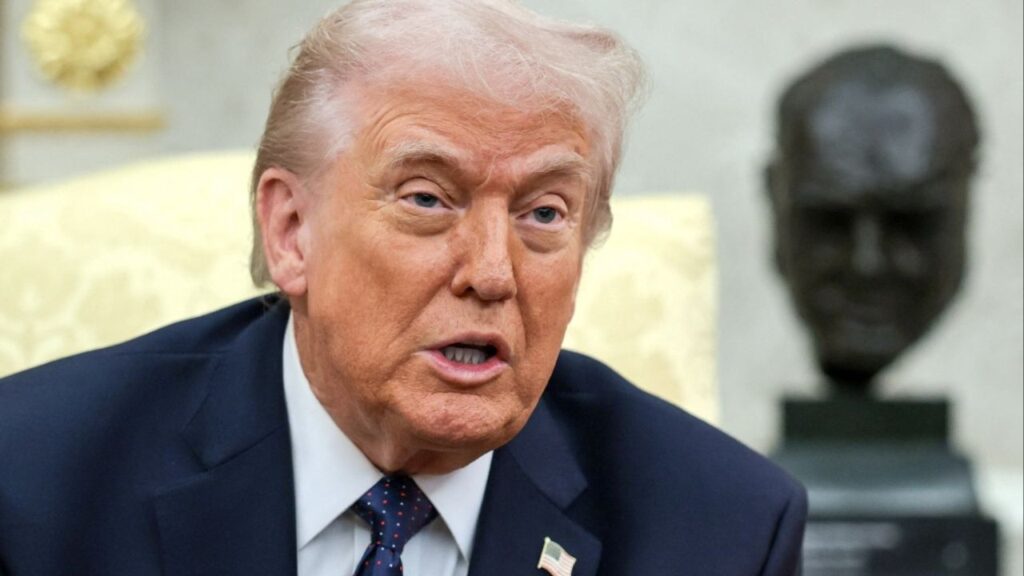Share
President Donald Trump’s decision Friday to not certify Iran as being in compliance with the 2015 nuclear agreement is raising alarms among experts on Middle East policy. Should the Iranian deal collapse as a result of the president’s action, the risk of war with Iran “is very clear,” says Dr. Trita Parsi.
“This deal prevented war by preventing Iran from having access to the bomb,” said Dr. Parsi, author of Treacherous Alliance: The Secret Dealings of Iran, Israel and the United States. “If you kill the deal, all the inspections and verification go out the window (and) and we have no idea what they’re doing. Under those circumstances, the very same voices that were constantly pushing the United States to go to war with Iran up until 2013 will once again start pushing for military action,” he said.
In announcing his decision, President Trump called Iran’s government a “rogue regime” that has “spread death, destruction, and chaos all around the globe.” In addition, he said the deal fails to sufficiently contain Iran’s nuclear ambitions, allowing it to “sprint towards a rapid nuclear weapons breakout” in just a few years.
Dr. Parsi disputes President Trump’s assessment of the nuclear deal’s effectiveness and points to pronouncements from the International Atomic Energy Agency, which monitors the agreement. “They have now confirmed in eight consecutive reports that the Iranians are in full compliance with the deal,” he said. “The head of the IAEA came out with a very strong statement repeating that the Iranians are in compliance and that the current inspections (program) in Iran is the strongest one that has ever been invented yet.”
Trump Says He Will Work With Congress, Allies
While not abandoning the deal entirely, President Trump said he will work with Congress and American allies to renegotiate key points of the agreement, “so that the Iranian regime can never threaten the world with nuclear weapons.” He endorsed efforts in Congress to strengthen enforcement and “make all restrictions on Iran’s nuclear activity permanent under U.S. law.”
That strategy is a non-starter, according to Dr. Parsi. “There’s nothing Congress can do to make the deal stronger because no legislative body and no one single country can unilaterally change the terms of this deal. That’s not the way things work.
“He wants Congress to try to change the terms of the nuclear deal which in and of itself is a violation. He also said that if Congress doesn’t do this, then he himself will collapse the deal. It essentially means that if Congress complies with what Trump wants then the deal will die. If it doesn’t, then Trump will kill the deal himself. Either way the deal will end up being dead as long as this path is pursued,” according to Dr. Parsi.
100,000 American Jobs Could Be Lost
U.S. business interests are watching events closely, Dr. Parsi says. “This will have an economic impact on the United States and elsewhere. Boeing, for instance, has several deals with Iranians that amount to roughly $41.6 billion. According to Boeing, that is supporting more than 100,000 jobs in the American economy. Those jobs will all be eliminated if the deal collapses.”
Dr. Parsi says the wild card in this developing drama appears to be held by European allies. “If Europe reacts by caving to the pressure from Trump and walks out of the deal – or doesn’t protect its companies that are now doing business in Iran – then the deal will completely collapse, because there is no value for the Iranians to be part of a deal that neither the Europeans or the Americans are respecting.” However, he said, “If Europe stands firm and protects the deal, then there’s a likelihood that the deal could survive, minus the United States.”
To hear a portion of this interview with Dr. Trita Parsi, click the player below.
Categories

Reddit Goes Down for Thousands of Users, Downdetector Shows


















